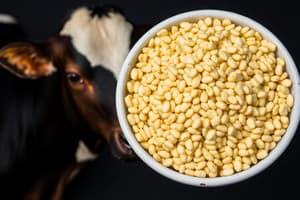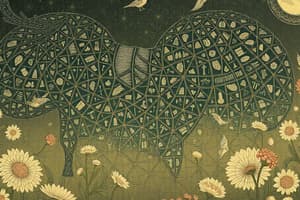Podcast
Questions and Answers
What is the definition of a feedstuff?
What is the definition of a feedstuff?
Any substance suitable for animal feed; several feedstuffs are combined to provide a balanced diet.
What are the desirable characteristics of feedstuffs? (List 6)
What are the desirable characteristics of feedstuffs? (List 6)
- Provide nutrients that are biologically available 2. No toxins or pathogens 3. Palatable 4. In a physical form that can be easily handled 5. Available in large enough quantities 6. Economical.
What is the definition of dry forages and roughages?
What is the definition of dry forages and roughages?
All forages that are cut and cured and other products with more than 18% Crude Fiber or 35% cell walls (dry basis).
What is the disadvantage of having a high cell wall content in dry forages and roughages?
What is the disadvantage of having a high cell wall content in dry forages and roughages?
What is the definition of pasture, range plants, and forages fed fresh?
What is the definition of pasture, range plants, and forages fed fresh?
What are the main crops used for silages?
What are the main crops used for silages?
What are energy feeds?
What are energy feeds?
Examples of energy feeds?
Examples of energy feeds?
What are protein supplements?
What are protein supplements?
Where do protein supplements come from?
Where do protein supplements come from?
What are examples of additives?
What are examples of additives?
What is the major feed in the US for dairy, beef, and horses?
What is the major feed in the US for dairy, beef, and horses?
What are the incentives to use pasture?
What are the incentives to use pasture?
What are the essential qualities of pasture?
What are the essential qualities of pasture?
Increasing maturity results in __________ protein content.
Increasing maturity results in __________ protein content.
Increasing maturity results in __________ energy content.
Increasing maturity results in __________ energy content.
Increasing maturity results in __________ fiber content.
Increasing maturity results in __________ fiber content.
Increasing maturity results in __________ mineral content.
Increasing maturity results in __________ mineral content.
Increasing maturity results in __________ carotene content.
Increasing maturity results in __________ carotene content.
What is the risk for cattle and sheep grazing pastures high in legumes?
What is the risk for cattle and sheep grazing pastures high in legumes?
_______ decrease palatability because of a bitter taste.
_______ decrease palatability because of a bitter taste.
What can occur in all livestock grazing sorghum following severe drought, early frost, or heavy trampling?
What can occur in all livestock grazing sorghum following severe drought, early frost, or heavy trampling?
What do white clover and alfalfa contain that can cause reproductive problems?
What do white clover and alfalfa contain that can cause reproductive problems?
What can result in a malformed fetus if ingested by a pregnant animal?
What can result in a malformed fetus if ingested by a pregnant animal?
What is found in sweet clover leaves that results in a decrease in palatability?
What is found in sweet clover leaves that results in a decrease in palatability?
What causes nitrate poisoning?
What causes nitrate poisoning?
What is one of the most widely recognized problems in cattle grazing lush, new-growth forage?
What is one of the most widely recognized problems in cattle grazing lush, new-growth forage?
What does green chop refer to?
What does green chop refer to?
What are the advantages of green chop?
What are the advantages of green chop?
What are the disadvantages of green chop?
What are the disadvantages of green chop?
What is hay?
What is hay?
Flashcards are hidden until you start studying
Study Notes
Feedstuff Overview
- Defined as any substance suitable for animal feed; combines several feedstuffs for a balanced diet.
- Serve as raw materials for animal production.
Desirable Characteristics of Feedstuffs
- Nutrients must be biologically available.
- Free from toxins and pathogens.
- Should be palatable.
- Must have a manageable physical form.
- Available in sufficient quantities.
- Should be economical and cost-effective.
Dry Forages and Roughages
- Comprise forages cut and cured with more than 18% crude fiber or 35% cell walls (dry basis).
- High cell wall content results in low net energy per unit weight.
Fresh Forages
- Include pasture, range plants, and forages fed fresh (soilage or green chop).
Silage Crops
- Main crops for silages are grass, legume forages, and corn.
Energy Feeds
- Products contain less than 20% protein and not more than 18% crude fiber or 35% cell walls (dry basis).
- Examples include cereal grains, sorghums, and byproduct feeds.
Protein Supplements
- Defined as having 20% or more crude protein.
- Sourced from oil meals and animal origin.
Additives in Animal Feed
- Common additives include mold inhibitors, antioxidants, antibiotics, flavors, enzymes, hormones, buffers, and direct-fed microbials.
Importance of Pasture
- Major feed source in the US for dairy, beef, and horses.
- Offers benefits like reduced labor, cost-effectiveness, and use of non-agricultural land.
Essential Qualities of Pasture
- Should be resilient and enduring.
- Must support early growth in the season and continue into late fall.
- Should form a compact turf to resist trampling.
- A diverse plant variety aids growth in varying soil conditions.
Maturity Effects on Forage Composition
- Increasing maturity results in reduced protein, energy, and carotene content.
- Higher maturity is linked to increased fiber content and decreased mineral content.
Grazing Risks
- Cattle and sheep grazing high-legume pastures face a risk of bloat.
- Tannins decrease palatability due to a bitter taste.
- Prussic acid poisoning can occur in livestock grazing sorghum after drought or trampling.
- Estrogenic flavonoids in white clover and alfalfa can cause reproductive issues.
- Alkaloids can cause fetal malformations in pregnant animals.
- Coumarin found in sweet clover decreases palatability.
- Nitrate poisoning from high nitrate accumulation can lead to abortion or death in livestock.
Common Issues in New-Growth Forage
- Hypomagnesemia, or grass tetany, is a recognized problem in cattle grazing lush forages.
Green Chop Definition and Benefits
- Fresh forage cut, chopped, and fed directly in confinement.
- Advantages include maximum nutrient yield per acre and lowered nutrient losses during harvest.
Green Chop Disadvantages
- Quality inconsistency day-to-day.
- Requires labor for daily harvest and feeding.
Hay Production
- Hay is created by dehydrating green forage to a moisture content of 15%.
Studying That Suits You
Use AI to generate personalized quizzes and flashcards to suit your learning preferences.




